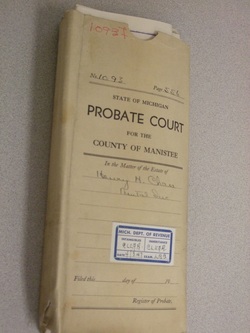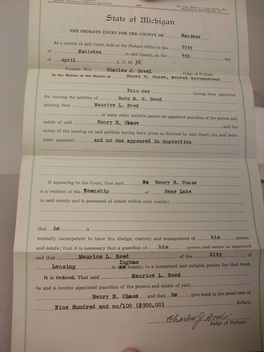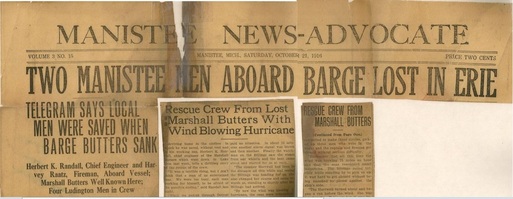I had known that Henry Hickox Chase died in the Traverse City State Hospital in 1940; what I didn't know was that the Manistee County Clerk had a treasure chest of papers, waiting to be discovered. She described it on the phone as a packet of guardianship records, and just said that there were "lots" of papers. It would have cost me $1 per page to have them photocopied, so I emailed my cousin (who lives in Benzonia County, the next county north to Manistee County), and asked if she could do me a huge favor and go the courthouse to take digital photos. She and her husband drove down that very afternoon, and took 75 digital photos of the papers, some of which were too fragile to be photocopied.
|
This is the second post in my series about records that are not online, and perhaps never will be. In preparing to start compiling my portfolio for certification, I decided on the family I want to write about: my paternal grandmother Ruby Chase Reed, her father Henry Hickox Chase and his mother Mary Ann Hickox Chase. Each of them have fascinating stories, and I'm fortunate to have lots of original records that I received from my grandfather's estate in 1974. In looking over the records, I realized that I didn't have some basic information - such as wills or probate records. So I wrote, and then called the Manistee County Probate Clerk to see about getting those. I had known that Henry Hickox Chase died in the Traverse City State Hospital in 1940; what I didn't know was that the Manistee County Clerk had a treasure chest of papers, waiting to be discovered. She described it on the phone as a packet of guardianship records, and just said that there were "lots" of papers. It would have cost me $1 per page to have them photocopied, so I emailed my cousin (who lives in Benzonia County, the next county north to Manistee County), and asked if she could do me a huge favor and go the courthouse to take digital photos. She and her husband drove down that very afternoon, and took 75 digital photos of the papers, some of which were too fragile to be photocopied. Courthouses all across the country are filled with papers like these!
It's not in the same league as the Edmund Fitzerald, and with a happier ending (all hands saved, not all hands lost), but there's no doubt that shipping on the Great Lakes was a precarious enterprise. I grew up hearing stories of the wreck my great-grandfather Herbert Randall survived in 1916, arriving on his doorstep in Manistee, Michigan, after a telegram had informed his wife Claudia of his death in Lake Erie. I have the good fortune to be in possession of the original front page of the Manistee News-Advocate of October 21, 1916, torn and yellowed by time. The headlines were biggest in Manistee, but news of the shipwreck was published all over the country, from Vermont to Iowa to Ohio. Most of them reported merely that the crew was safe, having been picked up by two different ships, but the Manistee paper had a long interview with Herbert Randall:
Arriving home in the clothes in which he was saved, without vest and in his working cap, Herbert K. Randall, chief engineer of the Marshall Butters which went down in Lake Erie last week, tells a thrilling story of the rescue of the crew. "It was a terrible thing, but I don't think that a man of us entertained fear. We were too busy, each man working for himself, to be afraid of the possible ending." said Randall last night. "When we passed through Detroit there was a fresh southeast wind blowing, but not strong enough to detain us any until we had passed the southeast shoal by about 45 minutes. It was at 12:30 Friday afternoon that the squall struck us. We were six or eight miles from the shoal light at the time. When it was first noticed that a storm was coming the captain came aft and asked us to work her up stronger. This took us about 20 minutes. Heavy seas began to roll about this time and we noticed that the ship was leaking, taking in water fast. "I understood what this meant and went forward and asked Capt. McClure to put her into the sea or before it. Instead of doing this Capt. McClure put her in the trough, in an attempt to throw her deck load off and lighten her. We were loaded with lath and a small amount of lumber above decks and had we been successful in getting rid of this load we might have ridden the gale longer. As it was she would not throw and we ran in the trough for a few minutes longer, watching the water meanwhile. We had the pumps going but the water kept gaining on us steadily and I again reported to the captain. "We had seen the steamer Billings about five miles to leeward and Capt. McClure blew the alarm signal. They apparently did not hear us, for they paid no attention. In about 15 minutes another alarm signal was blown and then another. Finally the watchman on the Billings saw the steam from our whistle and the boat came about and started for us at once. "The steamer Hartwell had been in the distance all this while and seeing the Billings was heading for us, she also changed her course and came towards us, standing to shortly after the Billings had arrived. "By now the wind was blowing a hurricane, the seas were tremendous and our deck load was going by the board. Heavy pieces of planking were lifted off the deck and sent hurling through the air. Pieces of boards and shingles caught in the whistle, causing it to blow continually. It was a horrible sound and when I could stand it no longer, I risked my life and climbed up to where I could cut the cord. "About this time we got the starboard boat launched and eight of the crew, including myself, got in and cast off. The captain of the Hartwell hollered, "Come on with your boat," and we headed for the steamer. It was a terrific pull to get to her. The seas were rolling higher than the house tops - the wind so strong that you had to yell to a man only a few feet away to make him hear you. "After about 20 minutes we were able to get aboard the Hartwell. Looking back to the Butters we could see the rest of the crew, five men, standing on her deck. I guess we all lost our nerve then. It was awful to see them standing there helpless. "It was just one-half hour after this that the Butters broke up and went down. A few minutes before she went under the captain and one fireman took to the yawl and the other three jumped into the water. "The steamer Billings after being compelled to make three circles, picked up three men who were in the water and the captain and fireman got aboard without serious difficulty. "Remember that all this time the wind ws blowing 75 miles an hour and that the seas resembled small mountains. The Billings rolled terribly while standing by to pick us up. It was hard to get aboard without being smashed to pieces against the ship's side. "The Hartwell turned about and began a run before the wind. She was consigned to Fairport, but it was impossible to make the harbor and she went on to Erie. She turned here and went into the wind. It was 5:30 Saturday afternoon when we finally made the Fairport harbor. "We had all lost everything we had but were mighty glad to get in as we were." I've come to the point where I've decided on the families I'm going to write about for my portfolio - for the kinship determination, and for the conflicting evidence report. In the last few days I have been looking through the binders I've compiled on those families, and I've had the startling realization that there are big, black, gaping holes in my research. What? I don't have a death certificate for my great-grandfather Henry Chase? I do have my handwritten transcription of the death record I found in Manistee County, Michigan when I visited in 1983 (odd, because he actually died in Grand Traverse County), and I also have extensive medical records from the Traverse City State Hospital. But not his death certificate.
Off goes an email to the Grand Traverse County Clerk. I can't believe I never thought of obtaining the will and/or probate records for several grandparents and great-grandparents. Probate records for Ruth (Prosser) Chase MIGHT give me information on her daughter Edna Strunk, who was living in New York at the time of Ruth's 1915 obituary, and hasn't been seen since. So I'm writing a request to the Manistee County Clerk for those records. A will for John Hickox, who died in Medina, Ohio, in 1835, might reveal the names of his grown children by his first marriage. It might even reveal names of siblings back in New York, which would enable me to figure out where in New York he lived before coming to Ohio. The Family History Library in Salt Lake City has Medina County, Ohio, wills on microfilm; next time I order film for a client I'll order a couple of films for myself, as well. Yes, it's past time for me to start treating my own research as I would my clients'! |
Archives
October 2023
Categories
All
All content (c) Claudia Breland, 2022
|




 RSS Feed
RSS Feed